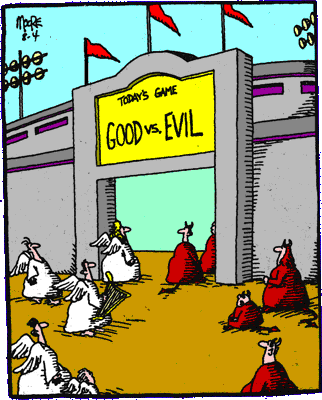Roger Ehrenberg at Information Arbitrage shares his thoughts on the year ahead. 
Some Thoughts on 2009
So much promise, so many risks. This is how 2009 is shaping up. While euphoria surrounding the Obama Administration’s fiscal stimulus plans will drive the markets early in the year, I believe this rally will lose steam as massive deficit spending begins to shine a light on the greatest risk facing the US: debasement of the currency. The power we will be handing our creditors is stunning, and in an unstable and highly politicized environment it may well be wielded to the detriment of the US economy. Can you imagine the prospect of China and Japan balking at buying more dollar-denominated assets? While some might say "Well, it wouldn’t be in their (US creditors’) own self-interest to precipitate a massive decline in the dollar," depending on the political stakes at hand I wouldn’t put it past them. This is a very unstable manner in which to run a country and an economy, where we’ve lost control of our balance sheet and, potentially, our political standing.
Michael Lewis and David Einhorn penned an insightful Op-Ed in yesterday’s New York Times. In effect, they raise several reasons for why the financial crisis happened and what can be done to address the problems. Interestingly, many of their root causes (mis-aligned, short-term Wall Street incentives, rating agencies’ conflicts of interest, regulators’ personal self-interests, etc.) and prescriptives (consistent, well-communicated Treasury policies, creation of healthy institutions through Government takeovers, sale of healthy assets and the long-term workout of bad assets, long-term emphasis separate from stock market impacts, etc.) are in line with the thinking I’ve put forth on this blog over the past 18 months.  One part of the article really got my back up. The Madoff meltdown and the existence of a whistleblower, Harry Markopolos, who had notified the SEC years before of his concerns is reminiscent of Einhorn’s indictments of both Lehman Brothers and Allied Capital Corp (ALD). Like Markopolos, Einhorn spent years seeking to educate the SEC about the wide-ranging fraud taking place at ALD but to no avail.
One part of the article really got my back up. The Madoff meltdown and the existence of a whistleblower, Harry Markopolos, who had notified the SEC years before of his concerns is reminiscent of Einhorn’s indictments of both Lehman Brothers and Allied Capital Corp (ALD). Like Markopolos, Einhorn spent years seeking to educate the SEC about the wide-ranging fraud taking place at ALD but to no avail.
This kind of regulatory breakdown is absolutely stunning, but not when one considers the mis-aligned motives of those doing the regulating. It is no different than the prevalence of short-termism on Wall Street, Corporate America and in our Government. While it is maddening, it only highlights the enormity of our task; to restructure the essence of how incentives are set in order to calibrate human nature with the good of society. This doesn’t mean that what is good for you can’t be good for society and vice versa. To the contrary, I believe we can balance self-interest with overall good. But when self-interest pays off in short-term ways, how are people going to act? You got it. This is among the biggest and most important challenges facing our Government, our companies and our citizens in 2009 and beyond.
So, here are a few trends that I think should – and will – prevail during 2009:
- Increased financial statement transparency. The "fair value" crowd will win the day. Investors are sick of surprises, and the only way these can be mitigated is through disclosure. Notwithstanding their poor performance over the past several years, the SEC recently supported the continued application of the fair value framework.
- The "exchanging" of credit derivatives and interest rates swaps. Keeping with the theme of transparency and adding a dose of simplicity, the trillions of dollars of exposure require far better tracking, disclosure and collateral management than has been in place up to now. Standardization is something that could and should have been addressed five years ago, but here we are. The time is now to liquify and demystify these opaque instruments.
- An explosion in illiquid asset trading. Given the magnitude of the stranded venture investments, private equity and hedge fund LP interests seeking to be offloaded and hundreds of billions of illiquid and "side pocketed" hedge fund assets, new venues will emerge for trading these risks. Venture capitalists and other early investors will want liquidity well before the IPO market comes back, and markets will spring up to handle these deals. And fund-of-funds, pensions and endowments in desperate need of liquidity will want as many options as possible for selling their LP interests and other illiquid holdings. This is a boom area for 2009 and 2010.
- A wholesale re-thinking of the role of rating agencies. If it wasn’t before, it is now abundantly clear that rating agencies did neither a good job nor were free of bias while serving in a quasi-fiduciary capacity. Their work, an essential element in the due diligence process covering trillions of dollars of paper, was found to be wholly inadequate at precisely the time it was most needed. Given that ratings put forth by the major agencies are suspect, might not a new system be called for? Or perhaps a scrapping of the role of rating agencies entirely? At this point why would issuers pay rating agencies for their imprimatur when it has been shown not to be worth much? I don’t know.

- Good Bank/Bad Bank (or a variant) will prevail as the financial services bailout tool of choice. The Treasury’s hundreds of billions of capital injections into sick institutions with sick managements made absolutely no sense then and it makes no sense now. There are two ways to help the system and minimize moral hazard: (1) engineer a wholesale takeover of failing firms, wipe out common shareholders and unsecured creditors, kick out management, sell good assets to the highest bidder and warehouse bad assets for an organized liquidation over time; and (2) replace management at failing firms, wipe out the common and unsecured debtholders, isolate the illiquid, "bad" assets and sell them at market value to a Government-sponsored liquidating trust, recapitalize the "good" assets with either private (preferred) or public funds and let it go forth and prosper. Either way the outcome is both logical and far superior to that which has been engineered by the current Administration. Let’s get a move on.
- The US stock market’s return profile will look like a parabola, rising early and then falling late. Excitement over Obama and his stimulus package will drive prices higher, bringing money off the sidelines that is afraid to miss the recovery. Problem is, the combination of a plunging real economy and tax receipts coupled with trillions in Treasury issuance to cover the bailout, fiscal stimulus, war operations and refinancing of existing debt will crush the dollar. If the emerging markets begin to recover and the US "flight to quality" trade falters, US stocks could be a laggard for quite some time. Dollar assets simply won’t look that attractive relative to developing nations with far more attractive growth prospects and with demographics to sustain this growth well into the middle of this century.

- Early-stage investing will be in its Renaissance. First is was private equity. Then it was hedge funds. Now I believe early-stage investing will create untold fortunes in this next cycle. Enabling technologies have made it so cheap to pursue new ideas that it is unleashing a wave of brainpower this world has never seen. Have an idea? Code it up. Processing power is cheap. Storage is cheap. And accessing customers has never been cheaper. There is a vibrancy across the early stage community – entrepreneurs, investors and customers – that simply doesn’t exist at other points along the investment spectrum. Investor fear notwithstanding, good ideas are getting funded, and those that get funding and survive in today’s hostile climate will emerge strong, game-tested, and ready to rock it when the economy recovers.
- The hedge fund industry "barbell" will only become more pronounced. I started writing about this in mid-2006, where I posited that the middle of the hedge fund industry would be squeezed. This has been borne out over the past few years, and represents a trend that will continue unabated in 2009. Institutions are redeeming out of funds large and small, but the largest funds will survive. Between sheer mass, long-term investor relationships and lock-ups the largest brand name funds will continue. Those funds that once populated the middle will not. Small funds will always exist, either as launch-pads for managers with grand visions or for investors content to run small, tightly-knit shops without the ever-present need to focus on marketing and customer relations. Bottom line, I think the fund with several hundred million under management will go the way of the dinosaurs.
- Market regulation will be revisited in spades. The key question is, are the changes incremental or wholesale? I’d argue that the current system combines the worst of many worlds, and headline-grabbing Congresspeople who think they look good by saying "increase regulation" without really understanding what that means could make things materially worse. We need to take a big step back, look at the tangle of regulations and regulatory bodies, pull out a piece of clean paper and say "What would a prudent regulatory framework look like?" It would likely emphasize transparency and disclosure, and be in sync with the accounting rule-makers at FASB. This is a huge undertaking, but one that needs to begin in earnest in 2009.

We’ll see how it goes. Regardless, 2009 should prove to be a very, very interesting year.


